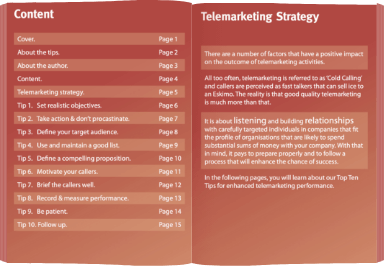If you’ve decided to conduct a b2b telemarketing campaign as part of your go-to-market strategy, there are several factors to consider. These include the nature of the market, trends, segmentation of your target audience, your proposition, and much more. Timing is a further consideration. Assuming that this form of marketing is one of your options, when is the right time to run a telemarketing campaign?
Is There a Right Time?
They say that timing is everything. Of course, if you strike at an opportune time, perhaps when a competitor has dropped the ball, or at contract end date, you stand a better chance of success.
Equally, it’s clear that certain sectors are busier than others at different times of year. Some organisations are flat out during the summer period. Others have their prime time at Christmas. And, some won’t consider looking at anything new during their busy periods.
Yet, external factors inevitably play a role. Market and economic triggers can drive demand for certain products and services. General legislation, such as GDPR, or sector-specific rules such as The Building Safety Act, may push management to seek solutions. Disasters such as Grenfell, prompted significant demand for organisations in fire prevention for example.
Consider Response Rates
Statistics suggest that timing is indeed vital. According to the Data & Marketing Association (DMA), the average response rate for a direct marketing campaign is around 9% within the first 30 days. However, this response rate drops to approximately 5% after 90 days. This decline suggests that waiting too long to initiate a campaign can, indeed, result in reduced effectiveness and lower response rates.
Of course, to some extent, statistics have to be taken with a pinch of salt. It’s important to assess the nature of your market, seasonality and market drivers. However, striking while the iron is hot is rarely a bad ploy!
Pick the Perfect Time
It’s fair to say that there is unlikely to be a right and wrong in pure terms. Some industries may be quiet in the summer, and at Christmas. Others may be super-busy during those periods. Some industries may be too busy to focus on non-essential activities at certain times of year. All of this may be true. Yet, to some extent, this could also be a limiting belief. In other words, without even testing the assumption, a decision may be made that customers will be too busy, or particularly unavailable at certain times. But, if your competitors choose to delay, isn’t there an opportunity for competitive advantage when there is less ‘noise’ in the marketplace?
In reality, It’s probable that your key competitors will receive the same business intelligence. And, they may also be planning their own marketing approaches. So,waiting, and being late to market is unlikely to be a good strategy.
Don’t Wait for a Sales Slowdown
The decision as to whether to wait until your own business is quieter to initiate a campaign, depends on your specific goals, your target audience, and the nature of your product or service. The problem can be that the later you leave it, the more difficult it will be, and the more desperate you may become. In most cases, leads won’t fly in from Day 1 of your outreach. It can take time, especially where the decision-making process is complex.
A slowdown may also mean that cash is tighter than when business is stronger. Therefore, a slowdown may make decision making much more difficult for you. The temptation may be to cut marketing investment at precisely the wrong time. Hence, one school of thought may well be to act while things are buoyant in order to keep them that way in traditionally quieter periods.
Recognise Business cycles
Most businesses have quiet periods when they need to boost sales leads. If so, that may well dictate the timing of your outreach. Equally, whilst some sectors may be inactive, others may not.
If your target businesses have specific periods of high or low activity, it may be beneficial to plan your telemarketing campaign during quieter periods. Or, you may consider starting in the middle of a busy period so you have a pipeline for your quieter months. This can increase the likelihood of reaching decision-makers especially where decision-making timeframes are lengthy.
Innovation Drives Interest
The best way to get inactive prospects off the fence is often being able to demonstrate to them something genuinely new and innovative. That’s especially the case where what you’re bringing to market is a game-changer, or at least something that makes clients’ lives easier. Whilst it’s hard to find truly unique solutions, these do come along. For example, there is increasing activity around solutions that deploy AI and Blockchain enabled solutions.
If your product launch delivers genuine benefit, especially to resolve a persistent problem in the market, timing becomes less important. Whilst not everyone is ready to buy, prompting awareness in advance of the buying cycle is imperative for pipeline building.
Lengthy Gestation Periods
If you have a restricted market, or a niche where gestation periods are long, it pays to kick off activity with this in mind. The driver behind slow decision-making may be down to budget periods, long contracts with incumbent providers, or simply due to other activities taking a higher priority. Don’t wait until your pipeline is completely dry before you start your efforts to refill it.
If the value of sale is high, decision-making may involve multiple layers and influencers. It may even go up to the board. Whilst you may get lucky, it’s unlikely these scenarios will produce quick wins. So, you need to build and nurture a pipeline. The only way to do that, until things come to fruition, is to start ahead of time.
Lead Generation Objectives
Ultimately, each business has its objectives. Management sets its targets that sales and marketing teams need to hit. If your new business run rate is such that the sales objective is achievable without additional effort, there will be less of an incentive to kick off significant new marketing campaigns.
However, if your primary objective is to generate leads or gather information, as opposed to delivering direct sales, initiating your telemarketing campaign during busier periods might be beneficial. Decision-makers may be more available during these times as they actively seek solutions, or explore business opportunities.
Given potentially longer timeframes for higher values of sale, sometimes the process is multi-tiered. You may publish a report or white paper. You might invite potential prospects to an event or webinar, well in advance of a potential sale. If that’s the case, it pays to plan in advance and kick off ahead of the time you need to close sales.
Review the Competitive Landscape
As mentioned earlier, you probably need to consider the competitive landscape and the timing of your competitors’ marketing efforts. If you have a unique offering or want to gain an advantage, launching your campaign sooner could help you establish a foothold ahead of competitors.
If you have already established, from previous outreach, when competitor contracts are coming to an end, timing is paramount. If you haven’t, perhaps you need to initiate a campaign to establish these follow-up contract end dates for future calls at the perfect time.
Grab Market Share
In highly competitive markets, being the first to engage with potential customers can provide a significant advantage. According to InsideSales.com, 50% of sales go to the vendor who responds first. By initiating your telemarketing campaign early, you increase the chances of being the first point of contact, establishing credibility, and building relationships before your competitors do.
If your market is large and open, that’s great. If there is a massive opportunity that isn’t being gobbled up by competitors, that’s wonderful. However, delaying your telemarketing campaign can put you at a disadvantage in a fiercely competitive market, especially where the market is awash with commoditised providers. .
Being proactive and reaching out early can help you secure market penetration, and a position of advantage, and increase your chances of capturing market share.
Time-sensitive Offers
Some telemarketing campaigns involve time-sensitive offers, promotions, or discounts. Studies have shown that urgency and a limited time-frame can significantly impact consumer response rates. For example, a study by the Journal of Advertising Research found that campaigns with deadlines had response rates 3.7 times higher than those without deadlines. By delaying your campaign, you may miss out on leveraging the power of urgency to drive customer action.
Don’t Miss Market Opportunities
Timing is crucial when it comes to capitalising on emerging trends, market shifts, or new business needs. Waiting too long to run your telemarketing campaign means missing out on potential opportunities to address customer pain points or to provide innovative solutions. The earlier you engage with your target audience, the more likely you are to seize those opportunities, and position yourself as a frontrunner in your industry.
Big opportunities don’t come along that often. Sometimes, you have to be brave, bite the bullet, and deploy appropriate resources to fire up your business development. Budget will almost always be tight. No-one has unlimited funds. However, don’t neglect market opportunities by undertaking weak lead generation, or by not doing it at all.
Erosion of your Own Customer Base
Sometimes, we can be so focused externally, which in most cases is a good thing, that we forget that competitors are approaching our customers. Hence, it pays to keep on top of customer relations. It’s essential to continue to reach out on a systematic basis to current customers, even those that perhaps are lower spending or that purchase less frequently. A regular customer care call can unearth new opportunities to do business through cross-sell, and upsell.
Typically, sales teams are focused on dealing with key accounts, higher spending customers, and new business. This leaves the internal team to deal with existing customers. But, sometimes, internal resources are stretched. They just don’t have the time to reach out, leaving customers on the fringes feeling unloved. These clients are most at risk of being tempted away by your competitors. So, make sure you have a regular systematic process for customer retention. This kind of phone call will rarely be a bad thing, even if it’s perhaps later than it should have been.
Conclusion
Delaying a telemarketing campaign can directly impact your company’s profitability. Telemarketing can generate leads, close deals, drive revenue growth, and enhance retention. By postponing the campaign, you extend the time it takes to start generating sales and revenue, potentially affecting your financial performance.
It’s important to strike the right balance between careful planning and timely execution when it comes to campaign execution. By understanding your target audience, and being proactive, you can mitigate the risks of leaving it too late, and maximise the potential benefits for your company.






